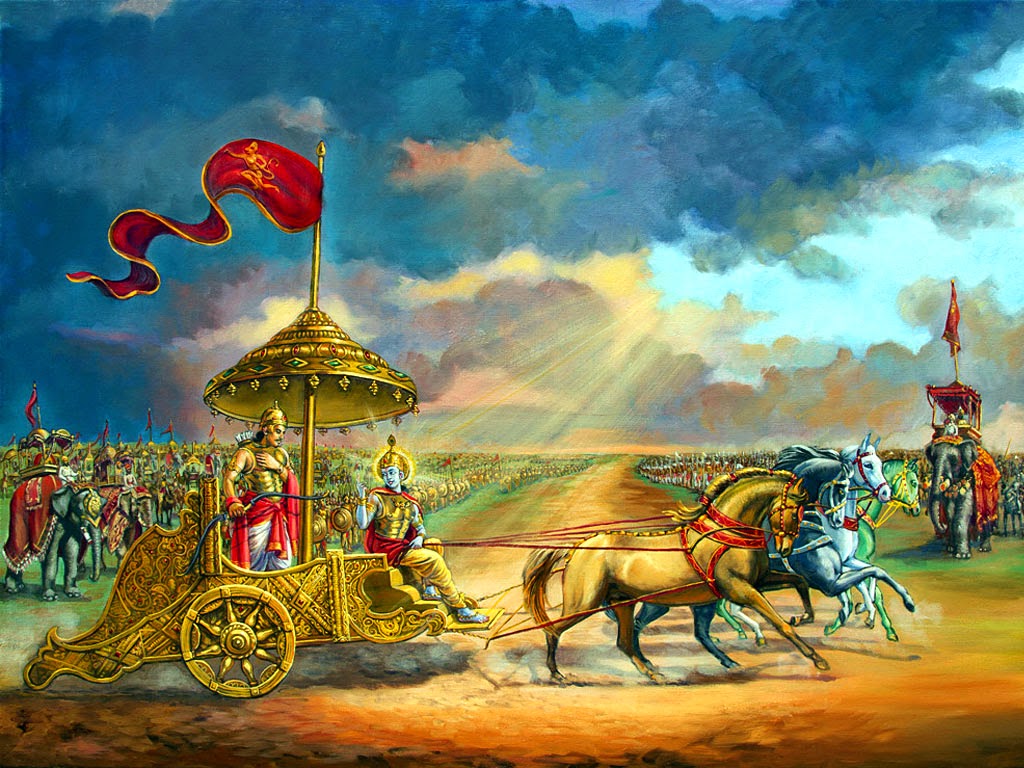
The meaning of the word yoga is loving union with the Supreme Lord. When Lord Krishna, the all-attractive Supreme Being descended to this world 5,000 years ago, He spoke the Bhagavad-gita. The most sublime of all yoga treatises, the Gita outlines how we souls who are living in the material world separate from God, can attain union with Him and return home to His kingdom. Krishna said in Bhagavad-gita:
And of all yogis, he who always abides in Me with great faith, worshiping Me in transcendental loving service, is most intimately united with Me in yoga and is the highest of all.
[Bhagavad-gita 6:47]
Krishna reiterates this message in the final chapter of Bhagavad-gita. Reassuring us of His love for us, He says:
Because you are my very dear friend, I am speaking to you the most confidential part of knowledge. Hear this from Me, for it is for your benefit. Always think of Me and become My devotee. Worship Me and offer your homage unto Me. Thus you will come to Me without fail. I promise you this because you are my very dear friend.
[Bhagavad gita 18:64-65
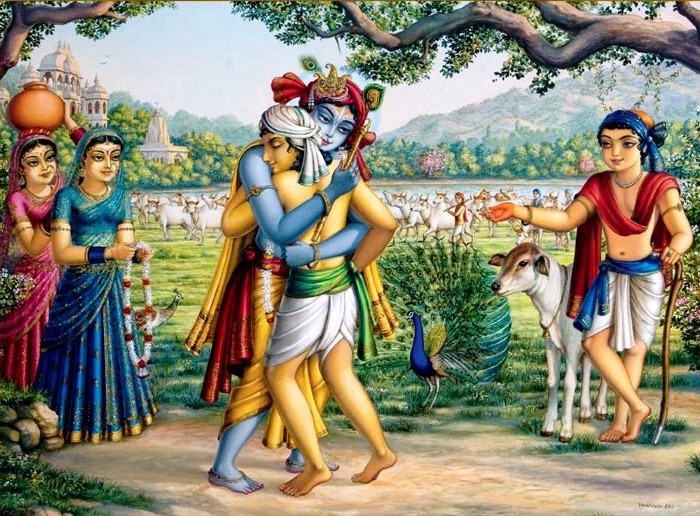
This is the aim of the bhakti yoga process – to be reunited with our dearest friend in an eternal loving relationship. And the closer we come to this goal the more we experience that our emptiness and loneliness are replaced by peace and inner happiness as our relationship with the Supreme Soul grows stronger. This is not only the goal of yoga – it is the goal of life for all of us as eternal spiritual beings.
Just to make it clear how we can attain this loving union, Krishna came again 500 years ago as Gauranga, the golden Lord Chaitanya, to teach the spiritual meditation process recommended in the Vedic yoga texts for this modern age we live in. His coming was predicted throughout the Vedic literatures, which were written down five thousand years ago.
In the Agni-Purana, it is said:
The Supreme Personality of Godhead will come in a golden form [gaura-anga], full of peace with a beautiful long neck. He will be surrounded by many saintly devotees.
In the Matsya-Purana, the Supreme Lord says:
In the age of Kali, I shall advent where the three rivers meet. I shall have a shaven head [mundah]. I shall have a golden complexion [gaurah]. I will be very kind and always chant the holy name of Krishna.
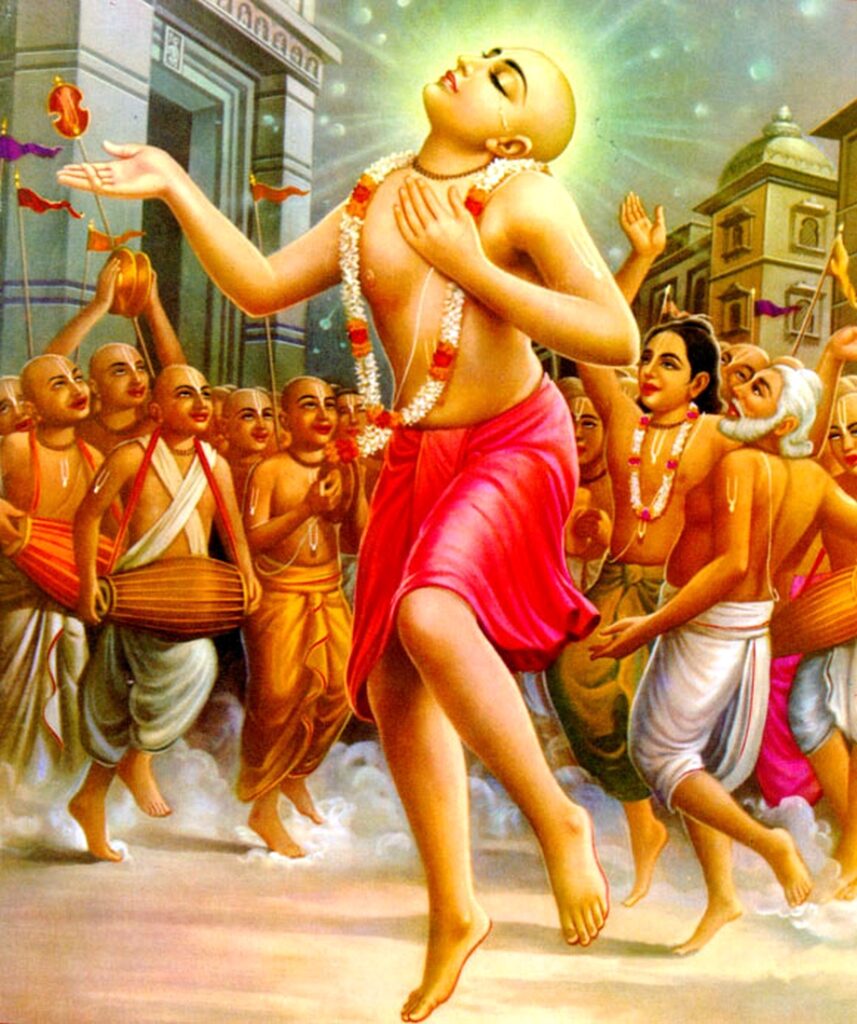
In the Vayu-Purana, the Supreme Lord states:
In the age of Kali-Yuga, I shall come in a place on the bank of the Ganges. I will be very pure, have a golden complexion [gaura], and be very tall and chant the holy names of Krishna.
In the Markandeya-Purana, the Supreme Lord declares:
In the Kali-Yuga, I will leave Goloka and, to save the people of the world, I will become the handsome and playful Lord Gauranga.
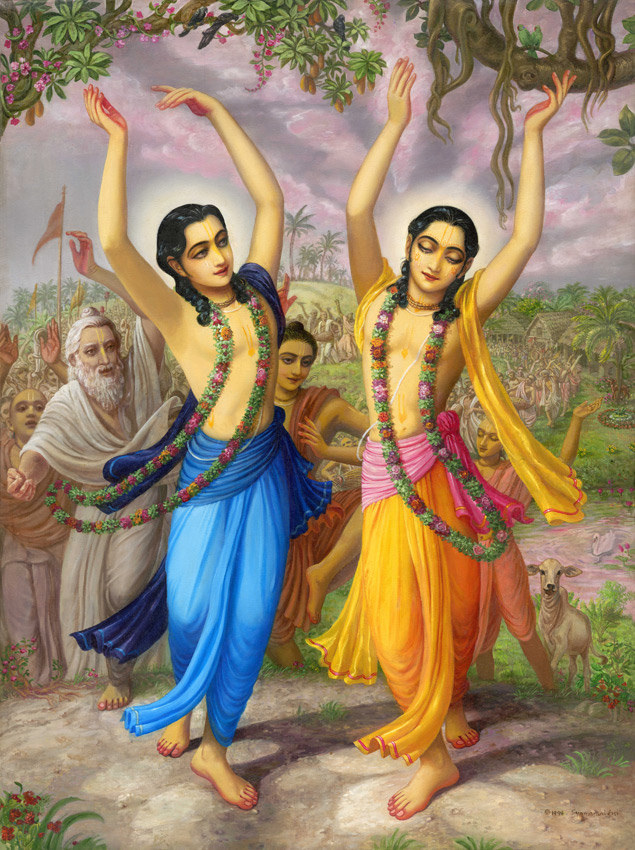
Bhagavad-gita and numerous other Vedic texts make it very clear that silent meditation, sitting cross-legged for many hours at a time in the forest or hermitage, is not possible for the vast majority of people in the world today. The astanga or kundalini yoga process is not recommended for this modern age. The recommended yoga meditation process for this age is kirtan, the congregational chanting of sacred mantras. This message is stated repeatedly throughout the Vedic yoga texts and taught by innumerable great saintly teachers. The importance of this chanting process in the present very materialistic age of Kali Yuga is made very clear in the Srimad Bhagavatam, which is described as being “the ripened fruit of the tree of Vedic knowledge” by the author of the Vedic scriptures, Srila Vyasadeva [Veda-vyas]:
My dear King, although Kali-yuga is an ocean of faults, there is still one good quality about this age: Simply by chanting the Hare Krishna maha-mantra, one can become free from material bondage and be promoted to the transcendental kingdom.
[Srimad Bhagavatam 12:3:51]
The religious practice for the age of Kali is to broadcast the glories of the holy name. Only for this purpose has the Lord, in a yellow colour, descended as Lord Chaitanya.
[Caitanya-caritamrta Adi 3:40]
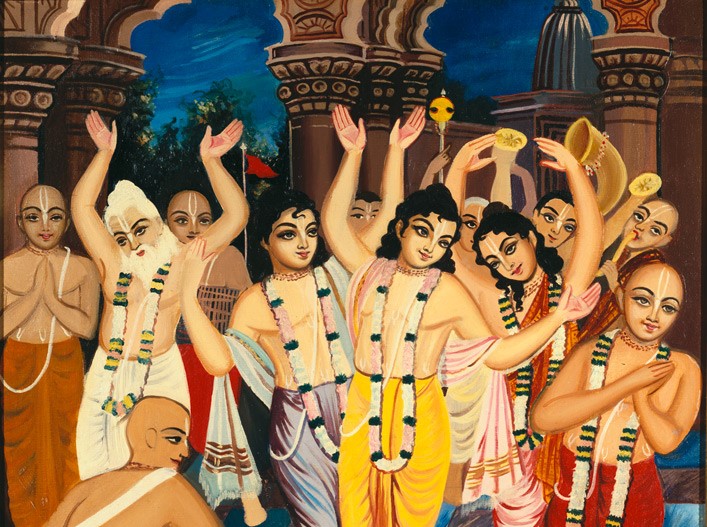
Within the vast Vedic scriptures of ancient India we find innumerable detailed descriptions of the glory and power of this kirtan process. The Srimad Bhagavatam further explains that the holy names are so powerful that they can purify us even though we may have no philosophical understanding or belief in their spiritual potency:
As a fire burns dry grass to ashes, so the holy name of the Lord, whether chanted knowingly or unknowingly, burns to ashes, without fail, all the reactions to one’s sinful activities. If a person, unaware of the effective potency of a certain medicine, takes that medicine or is forced to take it, it will act even without his knowledge because its potency does not depend on the patient’s understanding. Similarly, even though one does not know the value of chanting the holy name of the Lord, if one chants knowingly or unknowingly, the chanting will be very effective.
[Srimad Bhagavatam 6:2:18-19]
In the Skanda Purana, another Vedic literature, it states:
By once chanting the holy name of the Lord, which consists of the two syllables ha-ri, one guarantees his path to liberation.
[Skanda Purana]
Because the Lord is all-pure, His holy names have complete power to purify our hearts and will gradually bring us to the point of perfect love for God. Krishna says to Arjuna in the Adi Purana:
Anyone who is engaged in chanting My transcendental name must be considered to be always associating with Me. And I may tell you frankly that for such a devotee I become easily purchased.
[Adi Purana]
In the Padma Purana it is stated:
There is no difference between the holy name of the Lord and the Lord Himself. As such, the holy name is as perfect as the Lord Himself in fullness, purity, and eternity. The holy name is no material sound vibration, nor has it any material contamination.
O Narada, I am present wherever My devotees are chanting.
[Padma Purana]
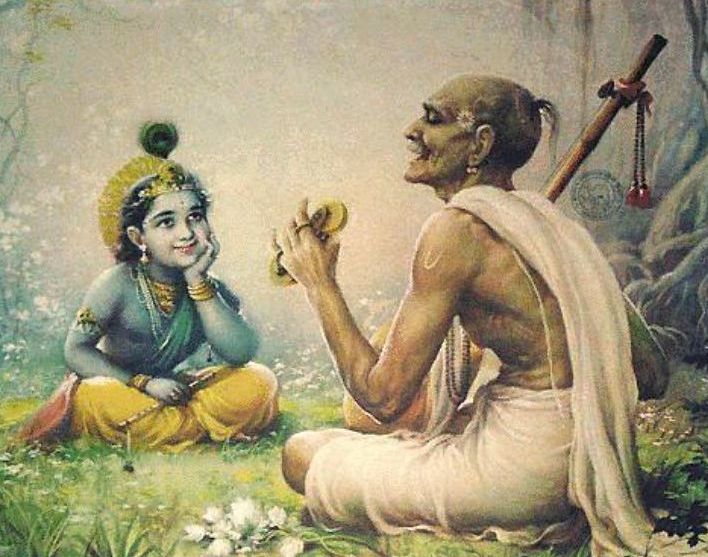
Chanting the Names of God in the Old Testament
In the Old and New Testaments of the Bible we also find many verses glorifying the great spiritual potency and benefit of chanting the sacred names of the Supreme. In the Old Testament, King David glorified the Lord in this way, singing His names and dancing with timbrel and lyre (harp) accompaniment. David is seen in the picture below, bringing the Ark of the Covenant into the City of Jerusalem:
And David danced before the Lord with all his might, wearing a priestly garment. So David and all the people of Israel brought up the Ark of the Lord with shouts of joy and the blowing of rams’ horns.
[2 Samuel 14-15]
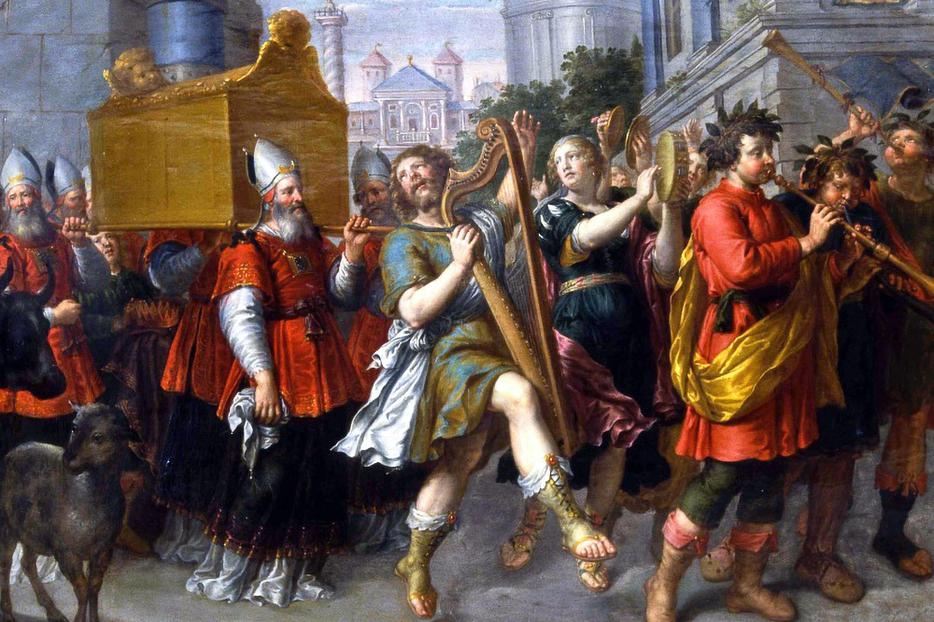
David was famous for glorifying the Lord, singing His names and playing his harp [lyre].
The Christian scholar Elmer L. Towns, in a book called “My Father’s Names,” talks about the use of various names of God in the Old Testament. Towns stated:
The names of God in the Bible indicate that He has personality, that He is a being with intellect, emotion and will. To many people, God is not personal. The German philosopher Hegel said that God is an impersonal being, just as a picture on the wall or a plate on the table. … But by revealing the names of God, the Old Testament presents Him as a powerful Person Who thinks, feels and makes decisions – He has the attributes of personality.
[“My Father’s Names”p.9-18]
According to early Jewish custom, the name of Jehovah was used in personal greetings, as “Jehovah be with you,” and “Jehovah bless thee.”
[Ruth 2:4]
In Old Testament times, the Jews felt that the divine name was equivalent to God’s presence or power. … So precious was the name of Jehovah … Eventually the name Jehovah was considered too holy to pronounce and the rabbis simply referred to it as ‘the Name,’ ‘the extraordinary name,’ or ‘the distinguished name.’ … Older teachers repeated this name to their disciples once every sabbatical year, but taught them that the name of God was to be concealed. Eventually the name ceased to be used.
[“My Father’s Names” p.20-23]
I have included a few of the many verses from Psalms in the Old Testament which describe the spiritual power and beauty of the Lord’s holy names:
Save me, O Lord, by Thy name.
[Psalms 54:1]
O God, my heart is fixed. I will sing and chant Your praise.
[Psalms 108:1]
Our help is in the name of the Lord, Who made heaven and earth.
[Psalms 124:8]
I will sing unto the Lord as long as I live; I will sing praise to my God while I have my being. My meditation of Him shall be sweet: I will be glad in the Lord.
[Psalms 104:33-34]
Praise ye the Lord. Praise O ye servants of the Lord, praise the name of the Lord. Blessed be the name of the Lord from this time forth and forevermore. From the rising of the sun unto the going down of the sun the Lord’s name is to be praised.
[Psalms 113:1-3]
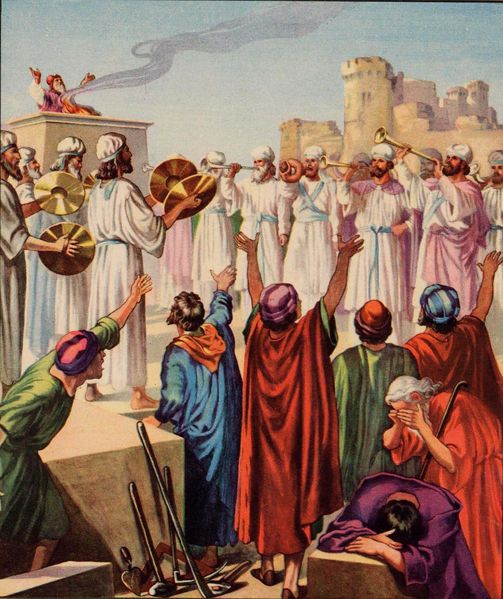
…Let them also that love Thy name be joyful in Thee.
[Psalms 5:11]
Make a joyful noise unto God, all ye lands. Sing forth the honour of His name – make His praise glorious. All the earth shall worship Thee, and shall sing unto Thee; they shall sing unto Thy name.
[Psalms 66:1-4]
Because Thy loving kindness is better than life, my lips shall praise Thee. Thus will I bless Thee while I live. I will lift up my hands in Thy name.
[Psalms 63:3-4]
Praise ye the Lord. Sing unto the Lord a new song, and His praise in the congregation of saints. Let them praise His name in the dance; let them sing praises unto Him with the timbrel and harp.
[Psalms 149:1,3]
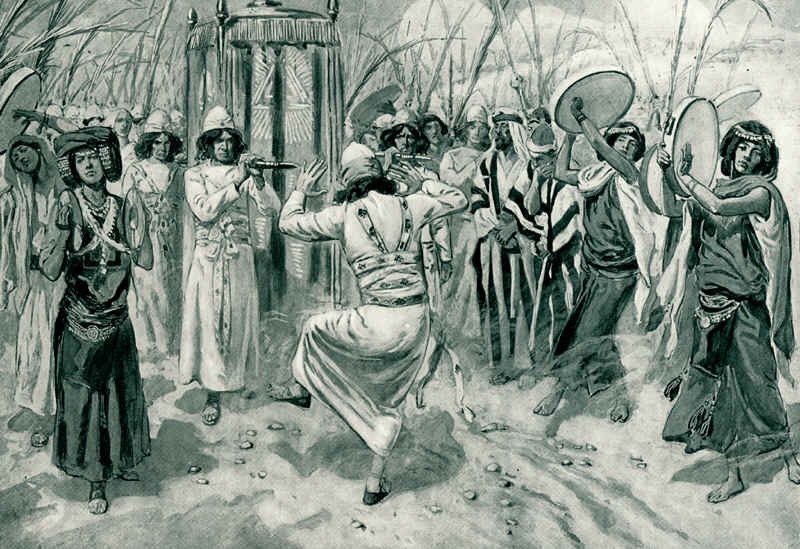
Let them praise the name of the Lord, for His name alone is excellent. His glory is above the earth and heavens.
[Psalms 148:13]
Chanting the Names of God in the New Testament
Towns continues:
When Jesus came, He taught the multitudes to call on the name of the Lord God by addressing their prayers to the Father, or “Abba”. He taught people to use the intimate introduction in prayer, as in “Our Father which art in heaven, hallowed be thy name.”
[“My Father’s Names” p.20-23]

So it is obvious from these beautiful verses that this kirtan process was important in the Old Testament times. We only have a small amount of the teachings of Lord Jesus Christ in the New Testament of the Bible – if you take into account the repetition in the four Gospels, Matthew, Mark, Luke and John, and put all of Jesus’ words together it amounts to about one 90 minute talk. However, what we do have of his teachings are very wonderful and completely in harmony with Vedic yoga teachings. And Jesus did teach kirtan, chanting the Lord’s name, to his disciples. He started the Lord’s Prayer with the words, Our Father Who art in heaven, hallowed be Thy name. Just prior to his crucifixion, Jesus prayed to God in the following manner:
I will remain in the world no longer, but they are still in the world, and I am coming to You. Holy Father, protect them by the power of Your name – the name You gave me – so that they may be one as we are one. While I was with them, I protected them and kept them safe by that name you gave me.
[John 17:11-12]
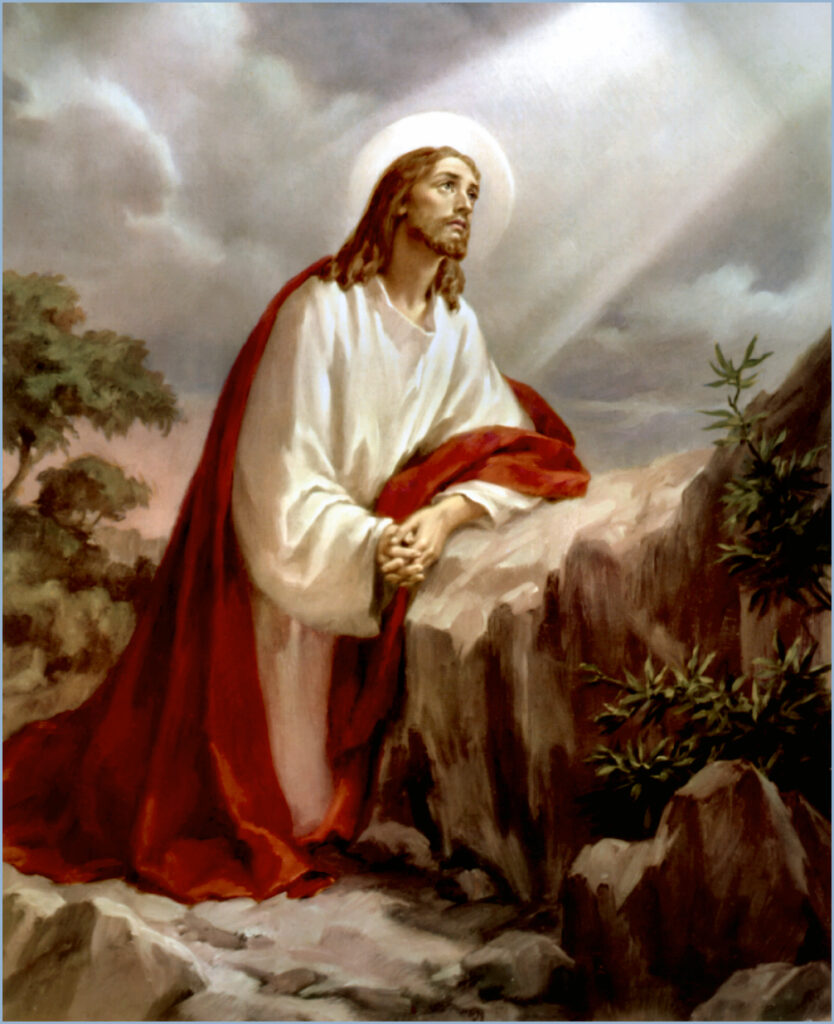
Both the one who makes men holy and those who are made holy are of the same family. So Jesus is not afraid to call them brothers. He says: I will declare Your name to my brothers. In the presence of the congregation, I will sing Your praises.
[Hebrews 2:11-12]
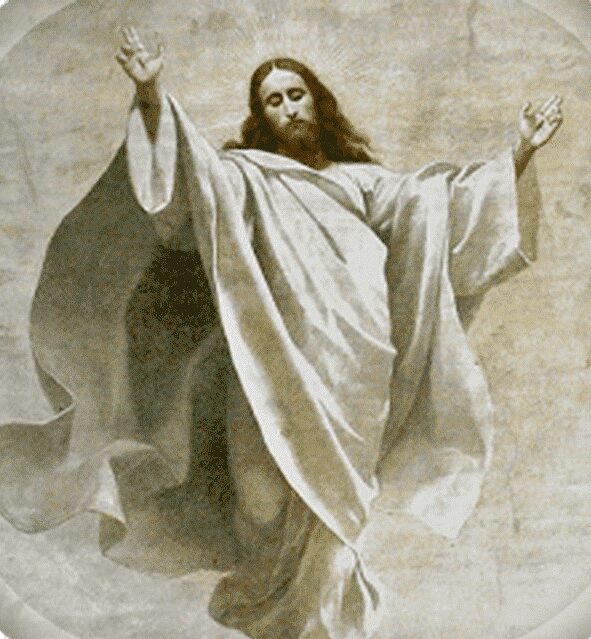
So, although this practice has become lost over time, it is very clear here that Jesus practiced kirtan with his followers and taught them to take shelter of the Lord’s holy names, and he stated that it was the names that protected them and kept them safe. So kirtan was obviously very important to Jesus and his original followers, but with time this process was lost.
Reciting The Names of God in Islam
Within Islam, there is also the practice of chanting the ninety-nine names of Allah upon prayer beads, and acknowledgment of the transcendental beauty of the Lord’s names:
Say: Call upon God, call upon the Merciful. Whichsoever name you call upon, to Him belong the names most beautiful.
[Koran 7:179]
And invoke in remembrance the name of your Lord, and devote yourself to Him with utter devotion.
[Koran 73: 8]
Sheikh Tosun Bayrak al-Jerrahi al-Halveti, in his book called “The Most Beautiful Names,” gives further information about the Islamic appreciation of the Lord’s names, as found in the hadiths. The “hadiths” are sayings of Mohammad which are grouped together to form supplements to the Koran.
Our beloved prophet (Mohammad) says in a hadith reported by Abu Hurayrah: ‘There are 99 names that are Allah’s alone. Whoever learns, understands and enumerates them enters Paradise and achieves eternal salvation.’
The sheikh goes on to explain:
This hadith does not mean that Allah has only 99 names. There are 230 further names attributed to Allah in the Koran, and infinite others which He has revealed to His choice creation …
[“The Most Beautiful Names” – Introduction]
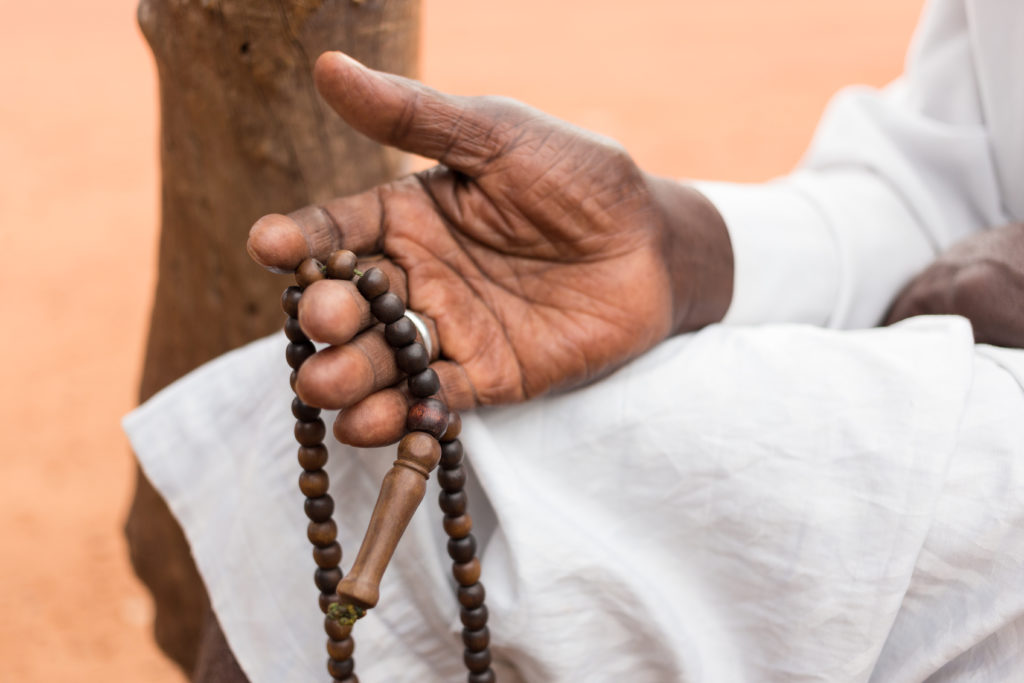
Rabbi Allen Maller, in an article posted on TMV website [November 17, 2019] titled The Best Names are Allah’s, has stated:
For Muslims, the word Allah is both a generic name for the one God of all monotheistic religions; and a special personal Islamic name when spoken with devotion and love by a Muslim believer.
I myself follow the words of the Koran that direct Muslims to say:
“We have believed in Allah and in what was revealed to us and what was revealed to Abraham, Ishmael, Isaac, Jacob, and the Tribes, and in what was given to Moses and Jesus and to the prophets from their Lord. We make no distinction between any of them, and we are Muslims [submitting] to Him.”
[Koran 3:84]
So, I believe that Jewish, Christian and Muslim religious leaders should always try to harmonize differences between the Sacred Scriptures of Moses, David, Jesus, and Muhammad, and avoid claiming that only one Holy Book (ours) can be true.
[Rabbi Allen Maller]

So, we also find this process of reciting the Lord’s Holy Names within the Islamic tradition. Actually, it is made very clear in all of the world’s major scriptures and spiritual traditions that the names of the Lord have the power to change our hearts from being lovers of matter to being lovers of spirit. Most certainly, they can offer us liberation from the suffering of the material world, and propel us into the spiritual dimension.
Taking Shelter of God’s Names at the Time of Death
The Vedic scriptures especially put emphasis on the potency of this chanting process as a means to transfer the soul from the material world to the spiritual world at the time of death. As there is no difference between the Supreme Spirit and His holy names, by taking shelter of these mantras at death we obtain the shelter and protection the Lord, and can thus attain Him. These mantras actually protect and embrace us like the loving arms of God. This is stated in many places throughout the Vedic scriptures.
In the Bhagavad-gita, the Supreme Lord states:
For one who worships Me, giving up all his activities unto Me and being devoted to Me without deviation, engaged in devotional service and always meditating upon Me, who has fixed his mind upon Me, O son of Prtha, for him I am the swift deliverer from the ocean of birth and death.
[Bhagavad-gita 12:6-7]
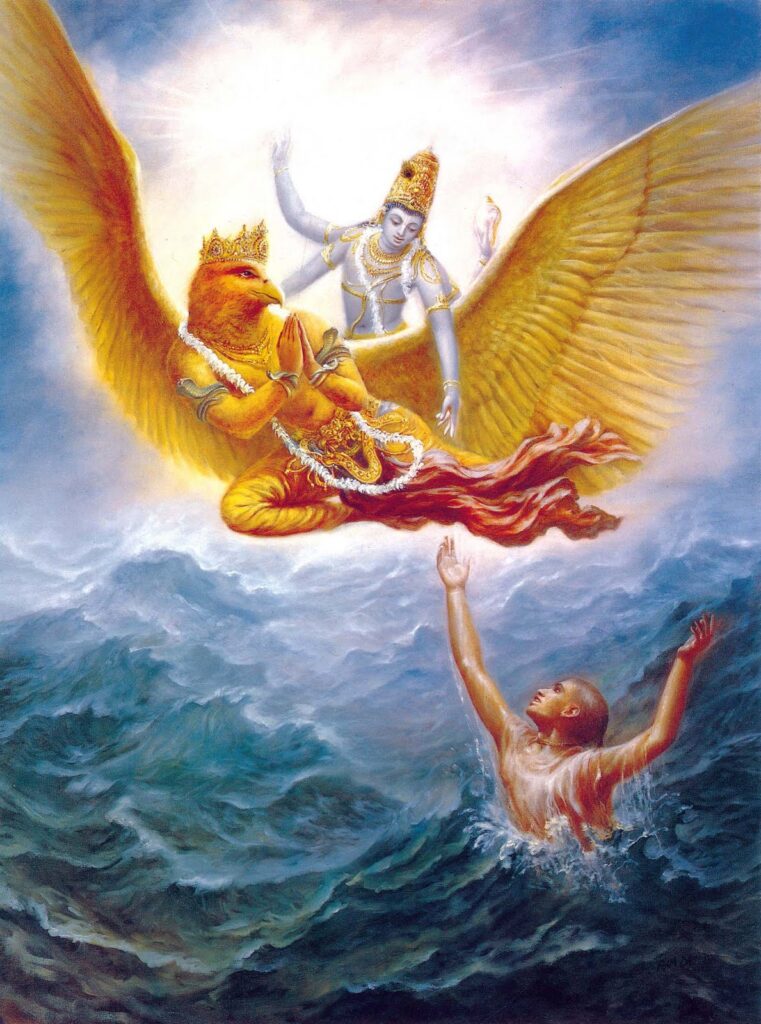
And whoever, at the time of death, quits his body remembering Me alone, at once attains My nature. Of this there is no doubt.
[Bhagavad-gita 8:5]
Simply by remembering God at the time of death, we can attain God’s spiritual kingdom. And the Srimad Bhagavatam describes the easiest and most effective way to attain this remembrance as being through the hearing and chanting of the Lord’s Holy Names:
Let me take shelter of the lotus feet of Him whose incarnations, qualities and activities are mysterious imitations of worldly affairs. One who invokes His transcendental names, even unconsciously, at the time he quits this life, is certainly washed immediately of the sins of many, many births and attains Him without fail.
[Srimad Bhagavatam 3:9:15]
All the sages said: ‘Dear Dhruva, O son of King Uttanapada … The holy name of the Lord is as powerful as the Lord Himself. Therefore, simply by chanting and hearing the holy name of the Lord, many men can be fully protected from fierce death without difficulty. Thus a devotee is saved.’
[Srimad Bhagavatam 4:10:30]
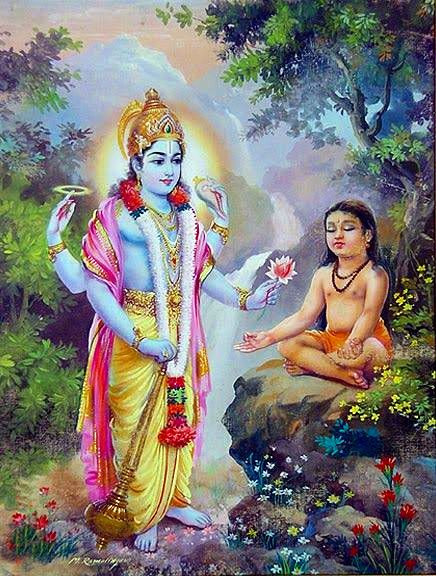
Living beings who are entangled in the complicated meshes of birth and death can be freed immediately by even unconsciously chanting the name of Krishna, which is feared by fear personified.
[Srimad Bhagavatam 1:1:14]
Haridas Thakur, a great saintly teacher and student of Lord Chaitanya who appeared in India 500 years ago was described as being the namacharya or teacher of the holy name. He wrote:
No knowledge is as pure as the holy name of the Lord. No vow is as powerful as the holy name. No meditation in the world is like the holy name. No philosophy brings a result like the holy name. No renunciation is greater than the holy name. Nothing will ever be equal to the holy name.
[Srila Haridas Thakur: Sri Harinama Chintamani 8:4-6]
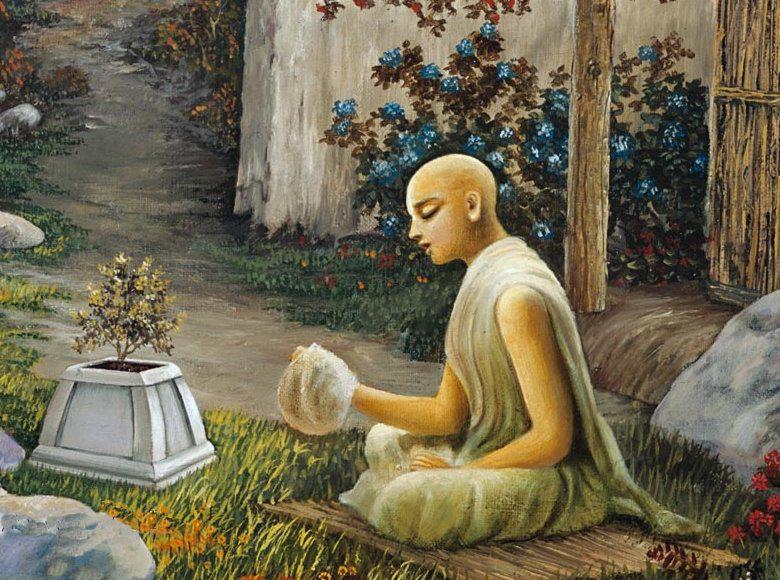
Lord Chaitanya’s Prayers
Lord Chaitanya wrote eight very beautiful prayers glorifying the holy names of the Supreme. His first three prayers state:
All glories to the congregational chanting and singing of God’s names, which cleanses the heart of all the dust accumulated for years together, and extinguishes the fire of conditional life, of repeated birth and death. This congregational chanting of the names of God is the prime benediction for humanity at large because it spreads the rays of the benediction moon. It is the life of all transcendental knowledge. It increases the ocean of transcendental bliss, and it enables us to fully taste the nectar for which we are always anxious.
O my Lord, Your holy name alone can render all benediction to living beings, and thus You have hundreds and millions of names like Krishna, Govinda, Allah and Jehovah. In these transcendental names You have invested all Your transcendental energies, and there are no hard and fast rules for chanting these names. O my Lord, out of kindness You enable us to easily approach You by chanting Your holy names, but I am so unfortunate that I have no attraction for them.
One should chant the holy names of the Lord in a humble state of mind, feeling oneself to be lower than the straw in the street. One should be more tolerant than the tree, devoid of all sense of false prestige, and ready to offer all respects to others. In such a state of mind one can chant the holy names of the Lord constantly.
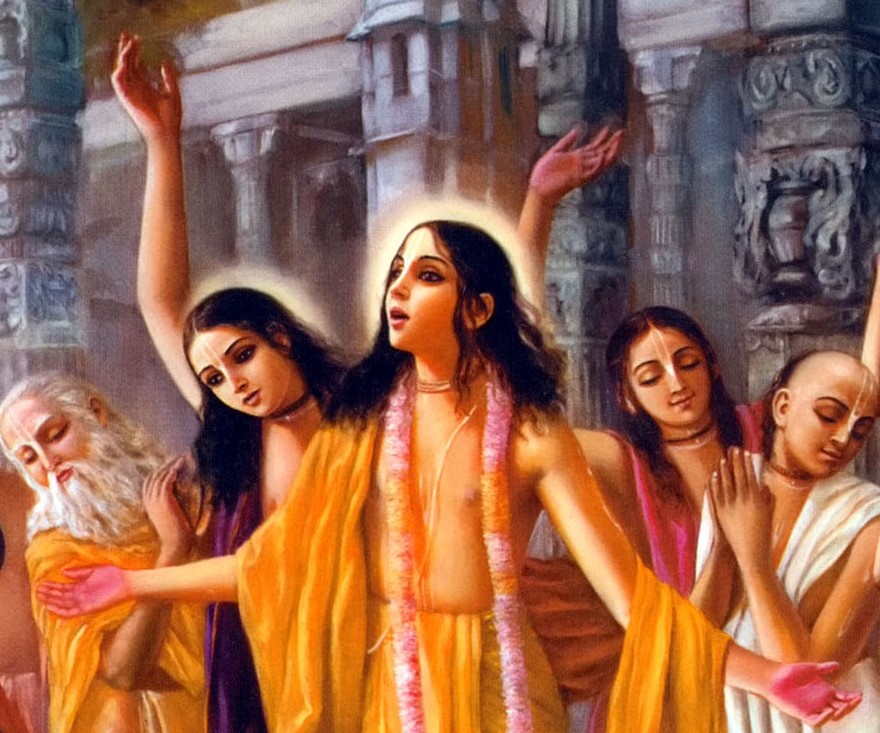

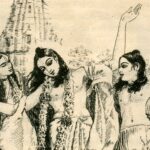
Leave A Reply